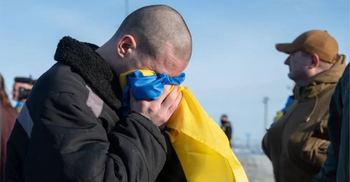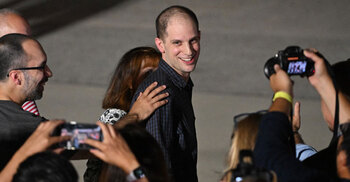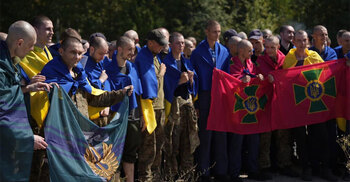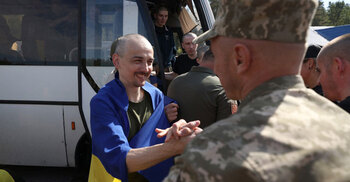Russia, Ukraine exchange 190 PoWs with UAE mediating

Russia and Ukraine carried out a new exchange of prisoners of war on Friday, each side bringing home 95 people in an agreement in which the United Arab Emirates acted as mediator. Russia’s defence ministry said on Telegram that the returning Russian service members were undergoing medical checks in allied Belarus. Video posted on Ukrainian president Volodymyr Zelenskyy’s Telegram account showed men – some wrapped in the Ukrainian flag – getting off a bus well after dark and being embraced by loved ones. A Russian military video showed smiling soldiers boarding buses. Ukrainian news reports said the returnees included Ukrainian journalist and rights advocate Maksym Butkevych, convicted by a Russian court of shooting at Russian forces.
A senior official in the eastern Ukrainian city of Pokrovsk – a key target in the westward advance of Russian forces – urged residents to evacuate on Friday as there was no way to provide essential services, the RBK Ukraine media outlet reported. “It is already clear that there will be no heating in the city,” it quoted Serhiy Dobrak, head of the military administration in Pokrovsk, as saying. “I appeal to city residents: if you see dragon’s teeth [anti-tank traps] being installed nearby, do not delay, pack up and leave. It will be dangerous.”
The US president, Joe Biden, and the leaders of the UK, Germany and France have pledged to keep up support for Ukraine and condemned “Russia’s continued war of aggression”. After meeting in Berlin, Biden, Keir Starmer, Olaf Scholz and Emmanuel Macron “reiterated their resolve to continue supporting Ukraine in its efforts to secure a just and lasting peace”. The leaders’ joint statement said they had “discussed their plans to provide Ukraine with additional security, economic and humanitarian assistance”. “We’re headed into a very difficult winter,” Biden said. “We cannot let up.”
Nato countries will need to discuss conditions for Ukraine to get a membership invitation and to join the alliance in response to Zelenskyy’s “victory plan”, the Dutch defence minister said. Ruben Brekelmans said on Friday there were “very different opinions” in the alliance on the issue. Zelenskyy presented the five-point plan publicly for the first time this week, including a call for an immediate Nato invitation. Brekelmans said that to reach the necessary consensus, allies would need to agree clear criteria that Ukraine would need to meet to get an invitation and others required to later become a member. “If you don’t have that clarity upfront, I don’t see 32 allies agree to granting an invitation,” he said after a meeting of Nato defence ministers in Brussels.
Vladimir Putin condemned comments by Zelenskyy suggesting Kyiv would seek nuclear weapons if it could not join Nato as a “dangerous provocation”. “Any step in this direction will be met with a corresponding reaction,” the Russian president said on Friday, adding: “It is not difficult to create nuclear weapons in the modern world.” Zelenskyy made his comments at an EU summit on Thursday in which he said “either Ukraine will have nuclear weapons, which will protect us, or we must have some kind of alliance”. Zelenskyy sought to clarify his words in a televised interview on Friday, saying Ukraine “did not intend to create any threat to the world nor any nuclear weapons”.
A Russian missile struck a residential district in Ukraine’s Black Sea port of Odesa late on Friday, triggering a fire, but causing no casualties, officials said. An official city Telegram channel said a three-storey building had sustained damage along with 10 private homes. Emergency services were at the site. There was no independent verification of the report. Odesa and port facilities in the region have come under increased Russian attack in recent weeks.
North Korea has dispatched troops to assist Russia in its war against Ukraine, according to South Korea’s intelligence agency – a development that could intensify the standoff between North Korea and the west. In a statement on its website on Friday, the National Intelligence Service (NIS) said Russian navy ships transferred 1,500 North Korean special operation forces to the port city of Vladivostok between 8 and 13 October who were now undergoing training, Pjotr Sauer reports. “The North Korean soldiers … are expected to be deployed to the frontlines as soon as they complete their adaptation training,” the agency said, adding that more North Korean troops were expected to be sent to Russia soon. Ukraine’s foreign minister, Andriy Sybiga, demanded an “immediate and strong reaction” from Kyiv’s allies to the North Korean deployment.
Donald Trump has blamed Volodymyr Zelenskyy for helping start Ukraine’s war with Russia, a comment that further suggests the Republican former president is likely to decrease US support for Kyiv if he wins the 5 November election. Trump’s comments on the PBD podcast on Thursday went a step further than his previous criticism of Zelenskyy and said the Ukrainian leader was to blame not just for failing to end the war but for helping start it, even though the conflict broke out when Russia invaded Ukrainian sovereign territory.
Russia has returned the bodies of 501 soldiers to Ukraine in what Associated Press said appeared to be the biggest repatriation of war dead since Russia’s 2022 invasion. Ukrainian authorities said law enforcement agencies and forensic experts would identify the victims, who would then be handed to family members for burial.
Zelenskyy said he had asked the defence ministry to work on proposals for possible weapons exports. The Ukrainian leader said the exports would be possible only to Ukraine’s allies in the Ramstein group, which coordinates military support for Kyiv. “Those who did not help us with the weapons, I think we do not have a right to export there,” he told Ukrainian TV. A possible rethink of an export ban imposed during the war against Russia would be a dramatic change in government policies.
Source: The Guardian







